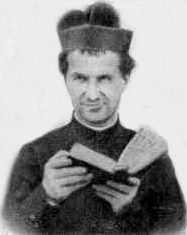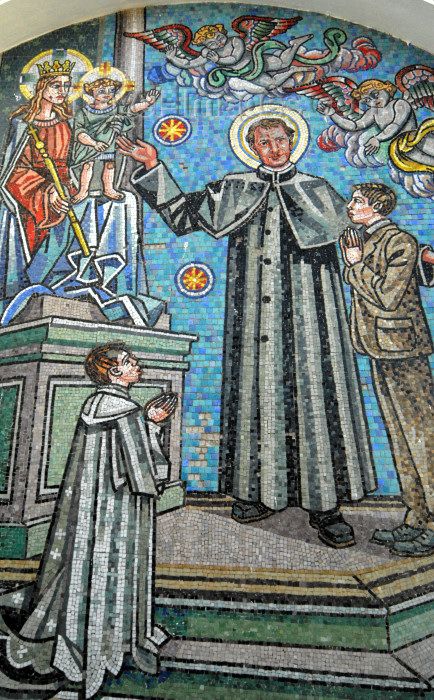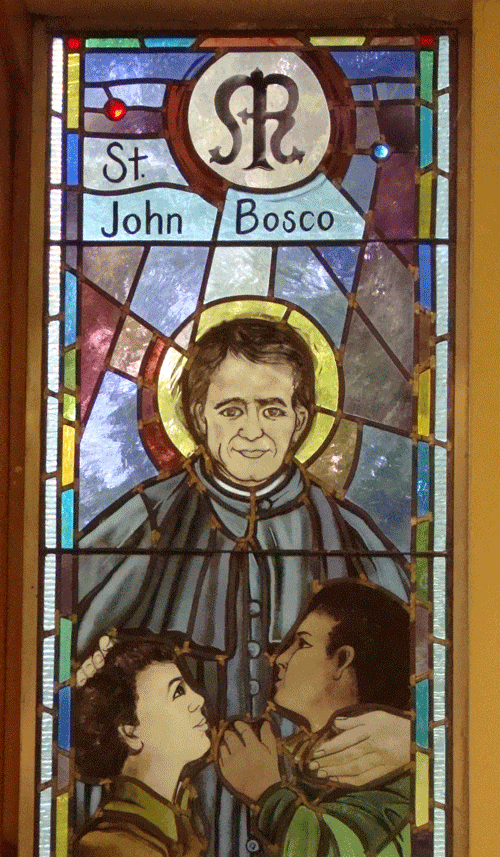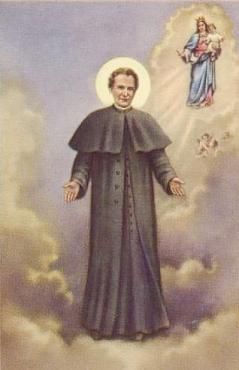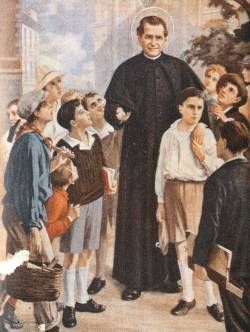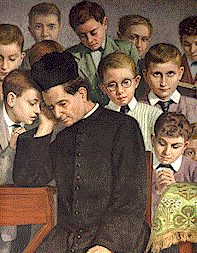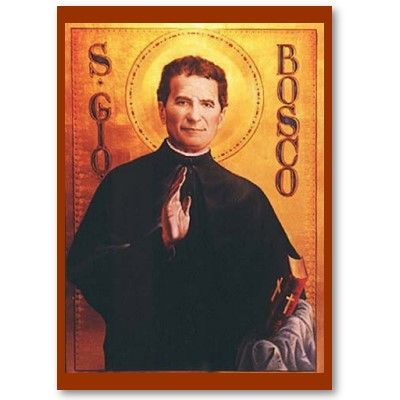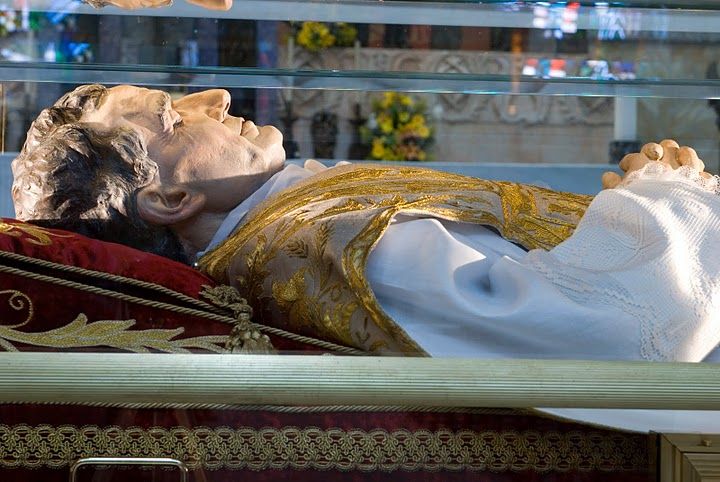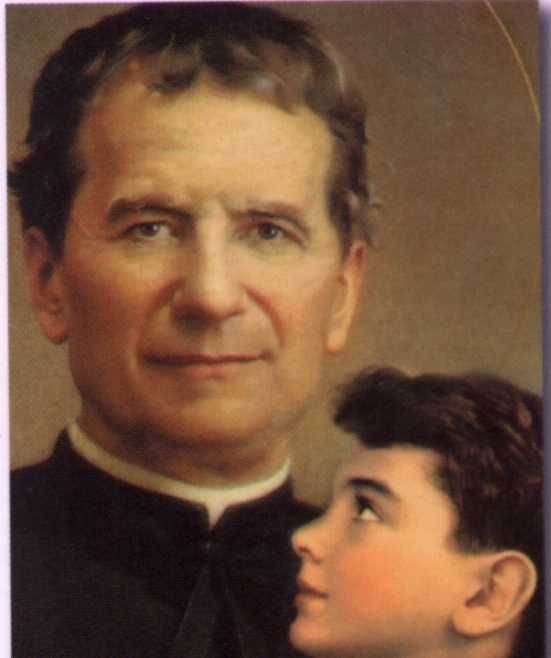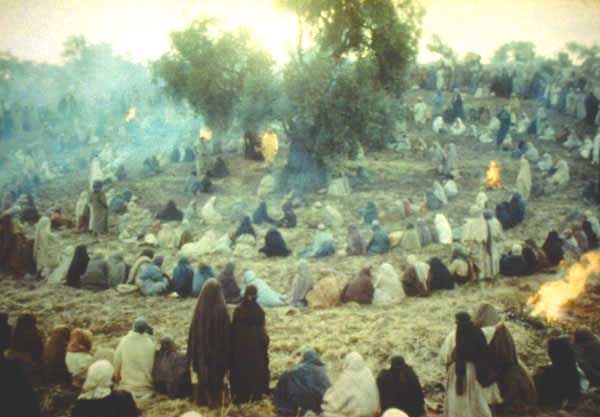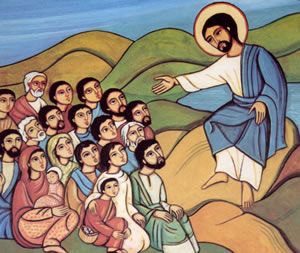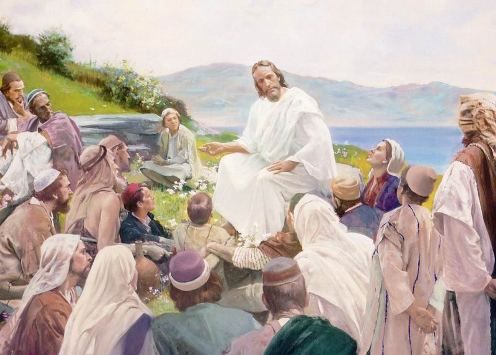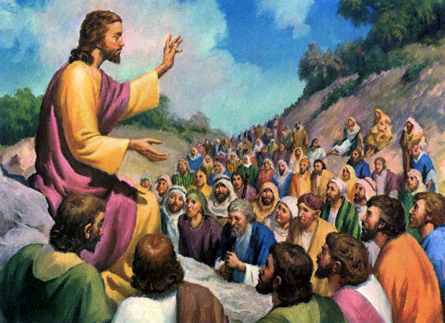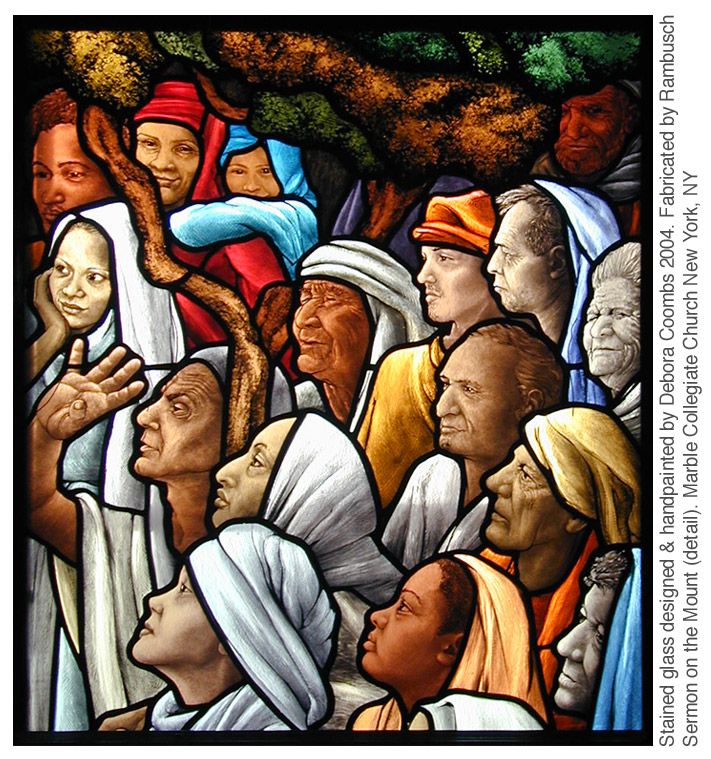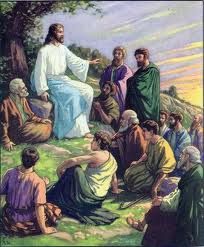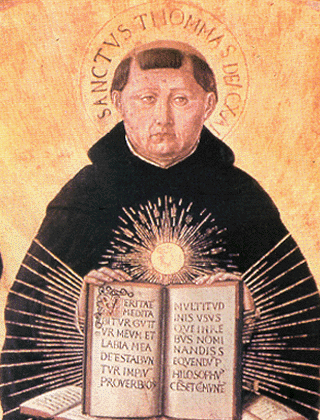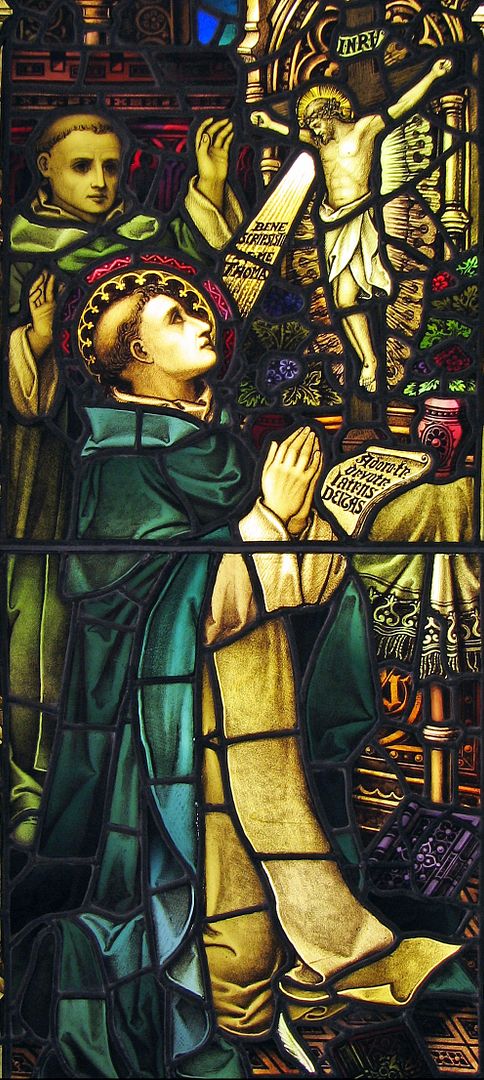Today, January 31, we celebrate the feast day of Saint John Bosco (1815-1888), Salesians Father, Founder, Confessor, and teacher and patron saint of youth. Saint John worked tirelessly throughout his life to provide education and spiritual instruction to the poor and orphaned children of the world. The orders he founded continue to pursue that mission today. Saint John is remembered for accepting anyone, loving everyone, saying: “A piece of Heaven fixes everything.”
The patron saint of youth, Saint John Bosco spent his life ministering to young people in need of education and religious instruction. Below, an excerpt from one of his letters, providing Guiding Principles for Youth Ministry and Parenting:
First of all, if we wish to appear concerned about the true happiness of our foster children and if we would move them to fulfil their duties, you must never forget that you are taking the place of the parents of these beloved young people. I have always laboured lovingly for them, and carried out my priestly duties with zeal. And the whole Salesian society has done this with me.
My sons, in my long experience very often I had to be convinced of this great truth. It is easier to become angry than to restrain oneself, and to threaten a boy than to persuade him. Yes, indeed, it is more fitting to be persistent in punishing our own impatience and pride than to correct the boys. We must be firm but kind, and be patient with them.
I give you as a model the charity of Paul which he showed to his new converts. They often reduced him to tears and entreaties when he found them lacking docility and even opposing his loving efforts.
See that no one finds you motivated by impetuosity or wilfulness. It is difficult to keep calm when administering punishment, but this must be done if we are to keep ourselves from showing off our authority or spilling out our anger.
Let us regard those boys over whom we have some authority as our own sons. Let us place ourselves in their service. Let us be ashamed to assume an attitude of superiority. Let us not rule over them except for the purpose of serving them better.
This was the method that Jesus used with the apostles. He put up with their ignorance and roughness and even their infidelity. He treated sinners with a kindness and affection that caused some to be shocked, others to be scandalised, and still others to hope for God’s mercy. And so he bade us to be gentle and humble of heart.
They are our sons, and so in correcting their mistakes we must lay aside all anger and restrain it so firmly that it is extinguished entirely.
There must be no hostility in our minds, no contempt in our eyes, no insult on our lips. We must use mercy for the present and have hope for the future, as is fitting for true fathers who are eager for real correction and improvement.
In serious matters it is better to beg God humbly than to send forth a flood of words that will only offend the listeners and have no effect on those who are guilty.
Monday, January 31, 2011
January 31: Saint John Bosco
“Do you want our Lord to give you many graces? Visit him often. Do you want him to give you few graces? Visit him seldom. Visits to the Blessed Sacrament are powerful and indispensable means of overcoming the attacks of the devil. Make frequent visits to Jesus in the Blessed Sacrament and the devil will be powerless against you.”
Today, January 31, we celebrate the feast day of Saint John Bosco (1815-1888), Salesians Father, Founder, Confessor, and teacher and patron saint of youth. Saint John worked tirelessly throughout his life to provide education and spiritual instruction to the poor and orphaned children of the world. The orders he founded continue to pursue that mission today. Saint John is remembered for accepting anyone, loving everyone, saying: “A piece of Heaven fixes everything.”
John was born in Turin, in the Piedmont region of Northern Italy, to a peasant family. His father died when John was only two years old, leaving he and his two brothers in the solitary care of his mother. The family, quite poor, struggled to make ends meet, and John began to work as soon as he was old enough to correctly manipulate tools. He also demonstrated piety and devotion to the Lord from an early age, and professed his wish to become a priest at the age of nine, following a dream. His goal, even from that early age, was to assist youth who suffered in the same manner in which he did. John wished to spread the word of the Gospel, even as a child. He demonstrated great initiative and creativity and learned magic tricks and acrobatics in an attempt to gather an audience so that he could later evangelize and catechize the children and adults of his town. He would begin with a prayer, and while he still had a crows, would often repeat the homily he had heard in church earlier in the week.
His mother approved his wish to become a priest, but to make that happen, John would have to leave home to receive an education in the city. Being larger than his peers, and noticeably more impoverished, John was the constant focus of his classmates’ ridicule and teasing. To pay for his education, John spent his evenings working in whatever capacity he could—as a tailor, cobbler, and a waiter—returning back to his small room to study through the night be candlelight. Upon graduation, he began his studies for the priesthood.
Like most things he set his mind to, John Bosco was ordained a priest at only twenty-six. During his time as a seminarian, he devoted his spare hours to looking after the urchins who roamed the slums of the city. Every Sunday he taught them catechism, supervised their games and entertained them with stories and tricks. He spent weekdays recruiting the roughest and dirtiest he could find, inviting them to the Sunday gatherings. Before long, his kindness had won their confidence, and his “Sunday School” became a ritual with them.
Upon ordination, Saint John immediately sought to formalize his ministry to the poor boys of the city, opening a hospice. When he was unable to secure a building in a “good” section of town, he took one in the slums. This first “oratory” was soon joined by three others, as educators and religious sought to join him in his ministry. His mother joined him as well, serving as housekeeper. Saint John fed and clothed the boys, but also spent long hours providing them with a basic education, and teaching them skills to obtain employment. Within the hospice was a tailoring and shoemaking room, as well as a printing press. Above all, he instructed the boys in the Gospel, modeling by example the life of Jesus Christ, and creating the atmosphere of a Christian family built on trust and love.
Noting the transformation of the youth he ministered to, Don (Father) Bosco began to gather followers to him, who accepted him as their spiritual advisor, leader, and guide. As their number grew, the Salesian Society of priests and lay brothers was formed. Named after Saint Francis de Sales, noted for his gentleness and kindness, Saint John Bosco dedicated this new society to the saint. Saint John traveled to Rome in 1858, and met with Pope Pius IX who encouraged his new religious community. Four years later, he founded an order for women, The Daughters of Mary, Help of Christians, to care for abandoned girls in the same manner.
By 1868, over 800 boys were being cared for in the Salesian oratories. Along with this, Saint John oversaw the writing, printing and distribution countless pamphlets that popularized Catholic teaching and answered the objections of anti-Catholics. Moreover, he was reported to receive supernatural guidance from the Lord, it the form of vivid dreams and visions, many of which he recounted. At times, he was able to predict the deaths of those he was close to, revealed by God, so that he might provide Last Rites. He also received a vivid vision of Hell, which he shared with all he encountered. Saint John is also remembered for working miracles, especially the multiplication of food when funds were short.
Saint John Bosco reformed the manner in which children were educated. Rather than the punitive system which was common at the time, John enacted a preventative system which rejected corporal punishment. By tending to basic needs, educational needs, and spiritual needs, the Salesians sought to put children in an environment which reduced the likelihood to commit sin. He advocated frequent reception of the sacraments of Penance and Holy Communion. He combined catechetical training and fatherly guidance, seeking to unite the spiritual life with his boys’ work, study and play. He is remembered for saying to those he ministered to: "It is enough to know that you are young and abandoned for me to love you very much."
Saint John Bosco died on January 31, 1888. His incorrupt relics are frequently taken on pilgrimage around the world, to visit the faithful. The work begun by Saint John continues today, with thousands dedicated to education youth at risk. The international society of the Salesians of Don Bosco administers over 3,000 schools, colleges, technical schools, and youth centers throughout the world (in 125 countries). All at risk children are served, regardless of religion or social inequalities. The mission of this tireless ministers is to be “signs and bearers of God’s love to the young.”
Saint John Bosco, you reached out to children whom no one cared for despite ridicule and insults. Help us to care less about the laughter of the world and care more about the joy of the Lord. Amen
Admirable apostle of youth, founder of religious Congregations, catechist, educator, writer, and a light that shone brightly in our time, you know that one of the greatest powers today is the power of the Press. Prompt editors to be always truthful and to work for the good of human beings, thus serving the greater glory of God. Amen.
Year 2: Day 30 of 365
Prayer Intentions: To be signs and bearers of God’s love to the young!
Requested Intentions: For a brother who is struggling financially, for a son who is struggling academically (B); For financial security for a friend (C); Success in business; familial happiness and health (J); Health and recovery of a sister (I); Development of a chaste relationship pleasing to the Lord (E); Successful surgery of mother; delivery of daughters’ babies (L); For a friend suffering with depression (M); For a friend entering religious life (R); Success of a parish men’s retreat (H); For a mother who is grieving; for the soul of a dearly departed son (M); Reconciliation of a marriage (M); End to grief after death of son (B&C); End to grief (S); Successful marriage (N); For an RCIA candidate struggling with financial and family stressors (O); Freedom from anxiety regarding medical procedure (J); Return home of an ill mother, peace and financial security (J); Restoration of a marriage; family peace (N); Freedom from persecution (A); For a friend struggling with medical problems and surgery (L); Financial blessings (D); For the success of a project (T); Improved financial stability (A); Improved relationship with business partner (A); For employment (N); Reconciliation of a workplace relationship (R); Healing of son, cousin, and friend (L); Healing of a husband from cancer, end to medical problems (T); Freedom from persecution (E); Successful employment (R); Healing of a father following stroke (S).
Today, January 31, we celebrate the feast day of Saint John Bosco (1815-1888), Salesians Father, Founder, Confessor, and teacher and patron saint of youth. Saint John worked tirelessly throughout his life to provide education and spiritual instruction to the poor and orphaned children of the world. The orders he founded continue to pursue that mission today. Saint John is remembered for accepting anyone, loving everyone, saying: “A piece of Heaven fixes everything.”
John was born in Turin, in the Piedmont region of Northern Italy, to a peasant family. His father died when John was only two years old, leaving he and his two brothers in the solitary care of his mother. The family, quite poor, struggled to make ends meet, and John began to work as soon as he was old enough to correctly manipulate tools. He also demonstrated piety and devotion to the Lord from an early age, and professed his wish to become a priest at the age of nine, following a dream. His goal, even from that early age, was to assist youth who suffered in the same manner in which he did. John wished to spread the word of the Gospel, even as a child. He demonstrated great initiative and creativity and learned magic tricks and acrobatics in an attempt to gather an audience so that he could later evangelize and catechize the children and adults of his town. He would begin with a prayer, and while he still had a crows, would often repeat the homily he had heard in church earlier in the week.
His mother approved his wish to become a priest, but to make that happen, John would have to leave home to receive an education in the city. Being larger than his peers, and noticeably more impoverished, John was the constant focus of his classmates’ ridicule and teasing. To pay for his education, John spent his evenings working in whatever capacity he could—as a tailor, cobbler, and a waiter—returning back to his small room to study through the night be candlelight. Upon graduation, he began his studies for the priesthood.
Like most things he set his mind to, John Bosco was ordained a priest at only twenty-six. During his time as a seminarian, he devoted his spare hours to looking after the urchins who roamed the slums of the city. Every Sunday he taught them catechism, supervised their games and entertained them with stories and tricks. He spent weekdays recruiting the roughest and dirtiest he could find, inviting them to the Sunday gatherings. Before long, his kindness had won their confidence, and his “Sunday School” became a ritual with them.
Upon ordination, Saint John immediately sought to formalize his ministry to the poor boys of the city, opening a hospice. When he was unable to secure a building in a “good” section of town, he took one in the slums. This first “oratory” was soon joined by three others, as educators and religious sought to join him in his ministry. His mother joined him as well, serving as housekeeper. Saint John fed and clothed the boys, but also spent long hours providing them with a basic education, and teaching them skills to obtain employment. Within the hospice was a tailoring and shoemaking room, as well as a printing press. Above all, he instructed the boys in the Gospel, modeling by example the life of Jesus Christ, and creating the atmosphere of a Christian family built on trust and love.
Noting the transformation of the youth he ministered to, Don (Father) Bosco began to gather followers to him, who accepted him as their spiritual advisor, leader, and guide. As their number grew, the Salesian Society of priests and lay brothers was formed. Named after Saint Francis de Sales, noted for his gentleness and kindness, Saint John Bosco dedicated this new society to the saint. Saint John traveled to Rome in 1858, and met with Pope Pius IX who encouraged his new religious community. Four years later, he founded an order for women, The Daughters of Mary, Help of Christians, to care for abandoned girls in the same manner.
By 1868, over 800 boys were being cared for in the Salesian oratories. Along with this, Saint John oversaw the writing, printing and distribution countless pamphlets that popularized Catholic teaching and answered the objections of anti-Catholics. Moreover, he was reported to receive supernatural guidance from the Lord, it the form of vivid dreams and visions, many of which he recounted. At times, he was able to predict the deaths of those he was close to, revealed by God, so that he might provide Last Rites. He also received a vivid vision of Hell, which he shared with all he encountered. Saint John is also remembered for working miracles, especially the multiplication of food when funds were short.
Saint John Bosco reformed the manner in which children were educated. Rather than the punitive system which was common at the time, John enacted a preventative system which rejected corporal punishment. By tending to basic needs, educational needs, and spiritual needs, the Salesians sought to put children in an environment which reduced the likelihood to commit sin. He advocated frequent reception of the sacraments of Penance and Holy Communion. He combined catechetical training and fatherly guidance, seeking to unite the spiritual life with his boys’ work, study and play. He is remembered for saying to those he ministered to: "It is enough to know that you are young and abandoned for me to love you very much."
Saint John Bosco died on January 31, 1888. His incorrupt relics are frequently taken on pilgrimage around the world, to visit the faithful. The work begun by Saint John continues today, with thousands dedicated to education youth at risk. The international society of the Salesians of Don Bosco administers over 3,000 schools, colleges, technical schools, and youth centers throughout the world (in 125 countries). All at risk children are served, regardless of religion or social inequalities. The mission of this tireless ministers is to be “signs and bearers of God’s love to the young.”
Saint John Bosco, you reached out to children whom no one cared for despite ridicule and insults. Help us to care less about the laughter of the world and care more about the joy of the Lord. Amen
Admirable apostle of youth, founder of religious Congregations, catechist, educator, writer, and a light that shone brightly in our time, you know that one of the greatest powers today is the power of the Press. Prompt editors to be always truthful and to work for the good of human beings, thus serving the greater glory of God. Amen.
Year 2: Day 30 of 365
Prayer Intentions: To be signs and bearers of God’s love to the young!
Requested Intentions: For a brother who is struggling financially, for a son who is struggling academically (B); For financial security for a friend (C); Success in business; familial happiness and health (J); Health and recovery of a sister (I); Development of a chaste relationship pleasing to the Lord (E); Successful surgery of mother; delivery of daughters’ babies (L); For a friend suffering with depression (M); For a friend entering religious life (R); Success of a parish men’s retreat (H); For a mother who is grieving; for the soul of a dearly departed son (M); Reconciliation of a marriage (M); End to grief after death of son (B&C); End to grief (S); Successful marriage (N); For an RCIA candidate struggling with financial and family stressors (O); Freedom from anxiety regarding medical procedure (J); Return home of an ill mother, peace and financial security (J); Restoration of a marriage; family peace (N); Freedom from persecution (A); For a friend struggling with medical problems and surgery (L); Financial blessings (D); For the success of a project (T); Improved financial stability (A); Improved relationship with business partner (A); For employment (N); Reconciliation of a workplace relationship (R); Healing of son, cousin, and friend (L); Healing of a husband from cancer, end to medical problems (T); Freedom from persecution (E); Successful employment (R); Healing of a father following stroke (S).
Sunday, January 30, 2011
Pope Saint Leo the Great: On the Beatitudes
Today, January 30, we read, in part, Matthew’s account of the Sermon on the Mount, the continuation of Jesus’ Proclamation of the Kingdom of Heaven, which began shortly after John the Baptist’s arrest and imprisonment. During the Sermon on the Mount, Jesus builds upon his teachings, providing the new commandments for Christian living. The Proclamation of the Kingdom of Heaven is the third Luminous Mystery—the Mysteries of Light—of the Holy Rosary.
The Sermon on the Mount included Jesus’ teachings regarding the Beatitudes. Below, a homily delivered by Pope Saint Leo the Great, Doctor of the Church, on the Beatitudes.
I. Introduction of the subject.
When our LORD Jesus Christ, beloved, was preaching the gospel of the Kingdom, and was healing various sicknesses through the whole of Galilee, the fame of His mighty works had spread into all Syria: large crowds too from all parts of Judaea were flocking to the heavenly Physician. For as human ignorance is slow in believing what it does not see, and in hoping for what it does not know, those who were to be instructed in the divine lore, needed to be aroused by bodily benefits and visible miracles: so that they might have no doubt as to the wholesomeness of His teaching when they actually experienced His benignant power. And therefore that the LORD might use outward healings as an introduction to inward remedies, and after healing bodies might work cures in the soul, He separated Himself from the surrounding crowd, ascended into the retirement of a neighbouring mountain, and called His apostles to Him there, that from the height of that mystic seat He might instruct them in the lottier doctrines, signifying from the very nature of the place and act that He it was who had once honoured Moses by speaking to him: then indeed with a more terrifying justice, but now with a holier mercifulness, that what had been promised might be fulfilled when the Prophet Jeremiah says: "behold the days come when I will complete a new covenant for the house of Israel and for the house of Judah. After those days, saith the LORD, I will put My laws in their minds, and in their heart will I write them." He therefore who had spoken to Moses, spoke also to the apostles, and the swift hand of the Word wrote and deposited the secrets of the new covenant in the disciples' hearts: there were no thick clouds surrounding Him as of old, nor were the people frightened off from approaching the mountain by frightful sounds and lightning, but quietly and freely His discourse reached the ears of those who stood by: that the harshness of the law might give way before the gentleness of grace, and "the spirit of adoption" might dispel the terrors of bondage.
II. The blessedness of humility discussed
The nature then of Christ's teaching is attested by His own holy statements: that they who wish to arrive at eternal blessedness may understand the steps of ascent to that high happiness. "Blessed," He saith, "are the poor in spirit, for theirs is the kingdom of heaven." It would perhaps be doubtful what poor He was speaking of, if in saying "blessed are the poor" He had added nothing which would explain the sort of poor: and then that poverty by itself would appear sufficient to win the kingdom of heaven which many suffer from hard and heavy necessity. But when He says "blessed are the poor in spirit," He shows that the kingdom of heaven must be assigned to those who are recommended by the humility of their spirits rather than by the smallness of their means. Yet it cannot be doubted that this possession of humility is more easily acquired by the poor than the rich: for submissiveness is the companion of those that want, while loftiness of mind dwells with riches. Notwithstanding, even in many of the rich is found that spirit which uses its abundance not for the increasing of its pride but on works of kindness, and counts that for the greatest gain which it expends in the relief of others' hardships. It is given to every kind and rank of men to share in this virtue, because men may be equal in will, though unequal in fortune: and it does not matter how different they are in earthly means, who are found equal in spiritual possessions. Blessed. therefore, is poverty which is not possessed with a love of temporal things, and does not seek to be increased with the riches of the world, but is eager to amass heavenly possessions.
III. Scriptural examples of humility.
Of this high-souled humility the Apostles first, after the LORD, have given us example, who, leaving all that they had without difference at the voice of the heavenly Master, were turned by a ready change from the catching of fish to be fishers of men, and made many like themselves through the imitation of their faith, when with those first-begotten sons of the Church, "the heart of all was one, and the spirit one, of those that believed:" for they, putting away the whole of their things and possessions, enriched themselves with eternal goods, through the most devoted poverty, and m accordance with the Apostles' preaching rejoiced to have nothing of the world and possess all things with Christ. Hence the blessed Apostle Peter, when he was going up into the temple, and was asked for alms by the lame man, said, "Silver and gold is not mine, but what I have that I give thee: in the Name of Jesus Christ of Nazareth, arise and walk." What more sublime than this humility? what richer than this poverty? He hath not stores of money, but he hath gifts of nature. He whom his mother had brought forth lame from the womb, is made whole by Peter with a word; and he who gave not Caesar's image in a coin, restored Christ's image on the man. And by the riches of this treasure not he only was aided whose lower of walking was restored, but 5,000 men also, who then believed at the Apostle's exhortation on account of the wonder of this cure. And that poor man who had not what to give to the asker, bestowed so great a bounty of Divine Grace, that, as he had set one man straight on his feet, so he healed these many thousands of believers in their hearts, and made them "leap as an hart" in Christ whom he had found limping in Jewish unbelief.
IV. The blessedness of mourning discussed.
After the assertion of this most happy humility, the LORD hath added, saying, "Blessed are they which mourn, for they shall be comforted." This mourning, beloved, to which eternal comforting is promised, is not the same as the affliction of this world: nor do those laments which are poured out in the sorrowings of the whole human race make any one blessed. The reason for holy groanings, the cause of blessed tears, is very different. Religious grief mourns sin either that of others' or one's own: nor does it mourn for that which is wrought by GOD's justice, but it laments over that which is committed by man's iniquity, where he that does wrong is more to be deplored than he who suffers it, because the unjust man's wrongdoing plunges him into punishment, but the just man's endurance leads him on to glory.
V. The blessedness of the meek.
Next the LORD says: "blessed are the meek, for they shall possess the earth by inheritance." To the meek and gentle, to the humble and modest, and to those who are prepared to endure all injuries, the earth is promised for their possession. And this is not to be reckoned a small or cheap inheritance, as if it were distinct from our heavenly dwelling, since it is no other than these who are understood to enter the kingdom of heaven. The earth, then, which is promised to the meek, and is to be given to the gentle in possession, is the flesh of the saints, which in reward for their humility will be changed in a happy resurrection, and clothed with the glory of immortality, in nothing now to act contrary to the spirit, and to be in complete unity and agreement with the will of the soul. For then the outer man will be the peaceful and unblemished possession of the inner man: then the mind, engrossed in beholding GOD, will be hampered by no obstacles of human weakness nor will it any more have to be said "The body which is corrupted, weigheth upon the soul, and its earthly house presseth down the sense which thinketh many things:" for the earth will not struggle against its tenant, and will not venture on any insubordination against the rule of its governor. For the meek shall possess it in perpetual peace, and nothing shall be taken from their rights, "when this corruptible shall have put on incorruption, and this mortal shall have put on immortality:" that their danger may turn into reward, and what was a burden become an honour.
VI. The blessedness of desiring righteousness.
After this the LORD goes on to say: "blessed are they who hunger and thirst after righteousness, for they shall be satisfied." It is nothing bodily, nothing earthly, that this hunger, this thirst seeks for: but it desires to be satiated with the good food of righteousness, and wants to be admitted to all the deepest mysteries, and be filled with the LORD Himself. Happy the mind that craves this food and is eager for such drink: which it certainly would not seek for if it had never tasted of its sweetness. But hearing the Prophet's spirit saying to him: "taste and see that the LORD is sweet;" it has received some portion of sweetness from on high, and blazed out into love of the purest pleasure, so that spurning all things temporal, it is seized with the utmost eagerness for eating and drinking righteousness, and grasps the truth of that first commandment which says: "Thou shalt love the LORD thy GOD out of all thy heart, and out of all thy mind, and out of all thy strength:" since to love GOD is nothing else but to love righteousness. In fine, as in that passage the care for one's neighbour is joined to the love of GOD, so, too, here the virtue of mercy is linked to the desire for righteousness, and it is said:
VII. The blessedness of the merciful:
"Blessed are the merciful, for GOD shall have mercy on them." Recognize, Christian, the worth of thy wisdom, and understand to what rewards thou art called, and by what methods of discipline thou must attain thereto. Mercy wishes thee to be merciful, righteousness to be righteous, that the Creator may be seen in His creature, and the image of GOD may be reflected in the mirror of the human heart expressed by the lines of imitation. The faith of those who do good' is free from anxiety: thou shalt have all thy desires, and shalt obtain without end what thou lovest. And since through thine alms-giving all things are pure to thee, to that blessedness also thou shalt attain which is promised in consequence where the LORD says:
VIII. The blessedness of a pure heart.
"Blessed are the pure in heart, for they shall see GOD." Great is the happiness, beloved, of him for whom so great a reward is prepared. What, then, is it to have the heart pure, but to strive after those virtues which are mentioned above? And how great the blessedness of seeing GOD, what mind can conceive, what tongue declare? And yet this shall ensue when man's nature is transformed, so that no longer "in a mirror," nor "in a riddle," but "face to face" it sees the very Godhead "as He is," which no man could see; and through the unspeakable joy of eternal contemplation obtains that "which eye has not seen, nor ear heard, neither has entered into the heart of man." Rightly is this blessedness promised to purity of heart. For the brightness of the true light will not be able to be seen by the unclean sight: and that which will be happiness to minds that are bright and clean, will be a punishment to those that are stained. Therefore, let the mists of earth's vanities be shunned. and your inward eyes purged from all the filth of wickedness, that the sight may be free to feed on this great manifestation of GOD. For to the attainment of this we understand what follows to lead.
IX. The blessedness of peace-making.
"Blessed are the peace-makers, for they shall be called the sons of GOD." This blessedness, beloved, belongs not to any and every kind of agreement and harmony, but to that of which the Apostle speaks: "have peace towards GOD;" and of which the Prophet David speaks: "Much peace have they that love Thy law, and they have no cause of offences." This peace even the closest ties of friendship and the exactest likeness of mind do not really gain, if they do not agree with GOD's will. Similarity of bad desires, leagues in crimes, associations of vice, cannot merit this peace. The love of the world does not consort with the love of GOD, nor doth he enter the alliance of the sons of GOD who will not separate himself from the children of this generation Whereas they who are in mind always with GOD, "giving diligence to keep the unity of the Spirit in the bond of peace," never dissent from the eternal law, uttering that prayer of faith, "Thy will be done as in heaven so on earth." These are "the peacemakers," these are thoroughly of one mind, and fully harmonious, and are to be called sons "of GOD and joint-heirs with Christ," because this shall be the record of the love of GOD and the love of our neighbour, that we shall suffer no calamities, be in fear of no offence, but all the strife of trial ended, rest in GOD's most perfect peace, through our LORD, Who, with the Father and the Holy Spirit, liveth and reigneth for ever and ever. Amen
The Sermon on the Mount included Jesus’ teachings regarding the Beatitudes. Below, a homily delivered by Pope Saint Leo the Great, Doctor of the Church, on the Beatitudes.
I. Introduction of the subject.
When our LORD Jesus Christ, beloved, was preaching the gospel of the Kingdom, and was healing various sicknesses through the whole of Galilee, the fame of His mighty works had spread into all Syria: large crowds too from all parts of Judaea were flocking to the heavenly Physician. For as human ignorance is slow in believing what it does not see, and in hoping for what it does not know, those who were to be instructed in the divine lore, needed to be aroused by bodily benefits and visible miracles: so that they might have no doubt as to the wholesomeness of His teaching when they actually experienced His benignant power. And therefore that the LORD might use outward healings as an introduction to inward remedies, and after healing bodies might work cures in the soul, He separated Himself from the surrounding crowd, ascended into the retirement of a neighbouring mountain, and called His apostles to Him there, that from the height of that mystic seat He might instruct them in the lottier doctrines, signifying from the very nature of the place and act that He it was who had once honoured Moses by speaking to him: then indeed with a more terrifying justice, but now with a holier mercifulness, that what had been promised might be fulfilled when the Prophet Jeremiah says: "behold the days come when I will complete a new covenant for the house of Israel and for the house of Judah. After those days, saith the LORD, I will put My laws in their minds, and in their heart will I write them." He therefore who had spoken to Moses, spoke also to the apostles, and the swift hand of the Word wrote and deposited the secrets of the new covenant in the disciples' hearts: there were no thick clouds surrounding Him as of old, nor were the people frightened off from approaching the mountain by frightful sounds and lightning, but quietly and freely His discourse reached the ears of those who stood by: that the harshness of the law might give way before the gentleness of grace, and "the spirit of adoption" might dispel the terrors of bondage.
II. The blessedness of humility discussed
The nature then of Christ's teaching is attested by His own holy statements: that they who wish to arrive at eternal blessedness may understand the steps of ascent to that high happiness. "Blessed," He saith, "are the poor in spirit, for theirs is the kingdom of heaven." It would perhaps be doubtful what poor He was speaking of, if in saying "blessed are the poor" He had added nothing which would explain the sort of poor: and then that poverty by itself would appear sufficient to win the kingdom of heaven which many suffer from hard and heavy necessity. But when He says "blessed are the poor in spirit," He shows that the kingdom of heaven must be assigned to those who are recommended by the humility of their spirits rather than by the smallness of their means. Yet it cannot be doubted that this possession of humility is more easily acquired by the poor than the rich: for submissiveness is the companion of those that want, while loftiness of mind dwells with riches. Notwithstanding, even in many of the rich is found that spirit which uses its abundance not for the increasing of its pride but on works of kindness, and counts that for the greatest gain which it expends in the relief of others' hardships. It is given to every kind and rank of men to share in this virtue, because men may be equal in will, though unequal in fortune: and it does not matter how different they are in earthly means, who are found equal in spiritual possessions. Blessed. therefore, is poverty which is not possessed with a love of temporal things, and does not seek to be increased with the riches of the world, but is eager to amass heavenly possessions.
III. Scriptural examples of humility.
Of this high-souled humility the Apostles first, after the LORD, have given us example, who, leaving all that they had without difference at the voice of the heavenly Master, were turned by a ready change from the catching of fish to be fishers of men, and made many like themselves through the imitation of their faith, when with those first-begotten sons of the Church, "the heart of all was one, and the spirit one, of those that believed:" for they, putting away the whole of their things and possessions, enriched themselves with eternal goods, through the most devoted poverty, and m accordance with the Apostles' preaching rejoiced to have nothing of the world and possess all things with Christ. Hence the blessed Apostle Peter, when he was going up into the temple, and was asked for alms by the lame man, said, "Silver and gold is not mine, but what I have that I give thee: in the Name of Jesus Christ of Nazareth, arise and walk." What more sublime than this humility? what richer than this poverty? He hath not stores of money, but he hath gifts of nature. He whom his mother had brought forth lame from the womb, is made whole by Peter with a word; and he who gave not Caesar's image in a coin, restored Christ's image on the man. And by the riches of this treasure not he only was aided whose lower of walking was restored, but 5,000 men also, who then believed at the Apostle's exhortation on account of the wonder of this cure. And that poor man who had not what to give to the asker, bestowed so great a bounty of Divine Grace, that, as he had set one man straight on his feet, so he healed these many thousands of believers in their hearts, and made them "leap as an hart" in Christ whom he had found limping in Jewish unbelief.
IV. The blessedness of mourning discussed.
After the assertion of this most happy humility, the LORD hath added, saying, "Blessed are they which mourn, for they shall be comforted." This mourning, beloved, to which eternal comforting is promised, is not the same as the affliction of this world: nor do those laments which are poured out in the sorrowings of the whole human race make any one blessed. The reason for holy groanings, the cause of blessed tears, is very different. Religious grief mourns sin either that of others' or one's own: nor does it mourn for that which is wrought by GOD's justice, but it laments over that which is committed by man's iniquity, where he that does wrong is more to be deplored than he who suffers it, because the unjust man's wrongdoing plunges him into punishment, but the just man's endurance leads him on to glory.
V. The blessedness of the meek.
Next the LORD says: "blessed are the meek, for they shall possess the earth by inheritance." To the meek and gentle, to the humble and modest, and to those who are prepared to endure all injuries, the earth is promised for their possession. And this is not to be reckoned a small or cheap inheritance, as if it were distinct from our heavenly dwelling, since it is no other than these who are understood to enter the kingdom of heaven. The earth, then, which is promised to the meek, and is to be given to the gentle in possession, is the flesh of the saints, which in reward for their humility will be changed in a happy resurrection, and clothed with the glory of immortality, in nothing now to act contrary to the spirit, and to be in complete unity and agreement with the will of the soul. For then the outer man will be the peaceful and unblemished possession of the inner man: then the mind, engrossed in beholding GOD, will be hampered by no obstacles of human weakness nor will it any more have to be said "The body which is corrupted, weigheth upon the soul, and its earthly house presseth down the sense which thinketh many things:" for the earth will not struggle against its tenant, and will not venture on any insubordination against the rule of its governor. For the meek shall possess it in perpetual peace, and nothing shall be taken from their rights, "when this corruptible shall have put on incorruption, and this mortal shall have put on immortality:" that their danger may turn into reward, and what was a burden become an honour.
VI. The blessedness of desiring righteousness.
After this the LORD goes on to say: "blessed are they who hunger and thirst after righteousness, for they shall be satisfied." It is nothing bodily, nothing earthly, that this hunger, this thirst seeks for: but it desires to be satiated with the good food of righteousness, and wants to be admitted to all the deepest mysteries, and be filled with the LORD Himself. Happy the mind that craves this food and is eager for such drink: which it certainly would not seek for if it had never tasted of its sweetness. But hearing the Prophet's spirit saying to him: "taste and see that the LORD is sweet;" it has received some portion of sweetness from on high, and blazed out into love of the purest pleasure, so that spurning all things temporal, it is seized with the utmost eagerness for eating and drinking righteousness, and grasps the truth of that first commandment which says: "Thou shalt love the LORD thy GOD out of all thy heart, and out of all thy mind, and out of all thy strength:" since to love GOD is nothing else but to love righteousness. In fine, as in that passage the care for one's neighbour is joined to the love of GOD, so, too, here the virtue of mercy is linked to the desire for righteousness, and it is said:
VII. The blessedness of the merciful:
"Blessed are the merciful, for GOD shall have mercy on them." Recognize, Christian, the worth of thy wisdom, and understand to what rewards thou art called, and by what methods of discipline thou must attain thereto. Mercy wishes thee to be merciful, righteousness to be righteous, that the Creator may be seen in His creature, and the image of GOD may be reflected in the mirror of the human heart expressed by the lines of imitation. The faith of those who do good' is free from anxiety: thou shalt have all thy desires, and shalt obtain without end what thou lovest. And since through thine alms-giving all things are pure to thee, to that blessedness also thou shalt attain which is promised in consequence where the LORD says:
VIII. The blessedness of a pure heart.
"Blessed are the pure in heart, for they shall see GOD." Great is the happiness, beloved, of him for whom so great a reward is prepared. What, then, is it to have the heart pure, but to strive after those virtues which are mentioned above? And how great the blessedness of seeing GOD, what mind can conceive, what tongue declare? And yet this shall ensue when man's nature is transformed, so that no longer "in a mirror," nor "in a riddle," but "face to face" it sees the very Godhead "as He is," which no man could see; and through the unspeakable joy of eternal contemplation obtains that "which eye has not seen, nor ear heard, neither has entered into the heart of man." Rightly is this blessedness promised to purity of heart. For the brightness of the true light will not be able to be seen by the unclean sight: and that which will be happiness to minds that are bright and clean, will be a punishment to those that are stained. Therefore, let the mists of earth's vanities be shunned. and your inward eyes purged from all the filth of wickedness, that the sight may be free to feed on this great manifestation of GOD. For to the attainment of this we understand what follows to lead.
IX. The blessedness of peace-making.
"Blessed are the peace-makers, for they shall be called the sons of GOD." This blessedness, beloved, belongs not to any and every kind of agreement and harmony, but to that of which the Apostle speaks: "have peace towards GOD;" and of which the Prophet David speaks: "Much peace have they that love Thy law, and they have no cause of offences." This peace even the closest ties of friendship and the exactest likeness of mind do not really gain, if they do not agree with GOD's will. Similarity of bad desires, leagues in crimes, associations of vice, cannot merit this peace. The love of the world does not consort with the love of GOD, nor doth he enter the alliance of the sons of GOD who will not separate himself from the children of this generation Whereas they who are in mind always with GOD, "giving diligence to keep the unity of the Spirit in the bond of peace," never dissent from the eternal law, uttering that prayer of faith, "Thy will be done as in heaven so on earth." These are "the peacemakers," these are thoroughly of one mind, and fully harmonious, and are to be called sons "of GOD and joint-heirs with Christ," because this shall be the record of the love of GOD and the love of our neighbour, that we shall suffer no calamities, be in fear of no offence, but all the strife of trial ended, rest in GOD's most perfect peace, through our LORD, Who, with the Father and the Holy Spirit, liveth and reigneth for ever and ever. Amen
January 30: Proclamation of the Kingdom of Heaven
Today, January 30, we read, in part, Matthew’s account of the Sermon on the Mount, the continuation of Jesus’ Proclamation of the Kingdom of Heaven, which began shortly after John the Baptist’s arrest and imprisonment. During the Sermon on the Mount, Jesus builds upon his teachings, providing the new commandments for Christian living. The Proclamation of the Kingdom of Heaven is the third Luminous Mystery—the Mysteries of Light—of the Holy Rosary.
The Mysteries of Light chronicle the ministry of Jesus, and the light of love and grace He brought into the world through his preaching and example. Theadditional Mysteries of Light include:
The Baptism of Jesus by Saint John the Baptist in the River Jordan
The Miracle at the Wedding Feast in Cana
The Transfiguration
The Institution of the Holy Eucharist at the Last Supper
14 After John was put in prison, Jesus went into Galilee, proclaiming the good news of God. 15"The time has come," he said. "The kingdom of God is near. Repent and believe the good news!" (Mark 1: 14-15)
Jesus proclaims his good news, as well as his role in the fulfillment of the Holy Scriptures. Through his coming, we are offered the keys to the Kingdom, rebirth in the grace of God, and reconciliation of our sins.
18"The Spirit of the Lord is on me, because he has anointed me to preach good news to the poor. He has sent me to proclaim freedom for the prisoners and recovery of sight for the blind, to release the oppressed, 19to proclaim the year of the Lord's favor."
20Then he rolled up the scroll, gave it back to the attendant and sat down. The eyes of everyone in the synagogue were fastened on him, 21and he began by saying to them, "Today this scripture is fulfilled in your hearing." (Luke 4:18-21)
Jesus is clear, preaching that the Kingdom of God is here now, that through the love and grace of God we are reconciled and freed, and that rather than having to search it out, the Kingdom of God resides within each of us. Heaven is not a place to ascend to of a final destination, but rather a transformative way of living, here on earth, as it is in heaven.
20Once, having been asked by the Pharisees when the kingdom of God would come, Jesus replied, "The kingdom of God does not come with your careful observation, 21nor will people say, 'Here it is,' or 'There it is,' because the kingdom of God is within you." (Luke 17:21)
Jesus further states quite plainly that earthly treasures, while attractive and glittery, only serve to distract us from our call inward to the Kingdom. God’s love for us resides within us, within our hearts, where our treasures also lie.
19"Do not store up for yourselves treasures on earth, where moth and rust destroy, and where thieves break in and steal. 20But store up for yourselves treasures in heaven, where moth and rust do not destroy, and where thieves do not break in and steal. 21For where your treasure is, there your heart will be also. (Matthew 6:19-21)
In the Sermon on the Mount, Jesus presents the Beatitudes, the new commandments for our lives. We are called to draw upon our internal gifts and graces, and embrace our true selves in the reflection of God within. We are called to cast off the shackles of appearance and impression management, and let the love of the Lord—the Kingdom within us—break free to shine like the sun. We are called to be the children of God now, at this moment, and forever.
1Now when he saw the crowds, he went up on a mountainside and sat down. His disciples came to him, 2and he began to teach them saying:
3"Blessed are the poor in spirit, for theirs is the kingdom of heaven.
4Blessed are those who mourn, for they will be comforted.
5Blessed are the meek, for they will inherit the earth.
6Blessed are those who hunger and thirst for righteousness, for they will be filled.
7Blessed are the merciful, for they will be shown mercy.
8Blessed are the pure in heart, for they will see God.
9Blessed are the peacemakers, for they will be called sons of God.
10Blessed are those who are persecuted because of righteousness, for theirs is the kingdom of heaven.
11"Blessed are you when people insult you, persecute you and falsely say all kinds of evil against you because of me. 12Rejoice and be glad, because great is your reward in heaven, for in the same way they persecuted the prophets who were before you.
19Anyone who breaks one of the least of these commandments and teaches others to do the same will be called least in the kingdom of heaven, but whoever practices and teaches these commands will be called great in the kingdom of heaven. 20For I tell you that unless your righteousness surpasses that of the Pharisees and the teachers of the law, you will certainly not enter the kingdom of heaven. (Matthew 5: 1-12, 19-20)
As we live our daily lives, we are called to contemplate the Kingdom of God. The Beatitudes tell us that our external sufferings on this earth are rewarded internally through the love and grace of Christ and the Holy Spirit. Our pain is fleeting compared to the everlasting joy yet to come in the Resurrection.
Dear Lord, give me the courage to be a true follower of Christ, using the examples He gave when proclaiming the Kingdom of God, in both my private and public life.
Help me to teach others about You wherever I go, whether it be through word or deed.
Amen.
Year 2: Day 30 of 365
Prayer Intentions: Endurance; Love for the Lord; Preparation for the Coming of the Kingdom
Requested Intentions: For a brother who is struggling financially, for a son who is struggling academically (B); For financial security for a friend (C); Success in business; familial happiness and health (J); Health and recovery of a sister (I); Development of a chaste relationship pleasing to the Lord (E); Successful surgery of mother; delivery of daughters’ babies (L); For a friend suffering with depression (M); For a friend entering religious life (R); Success of a parish men’s retreat (H); For a mother who is grieving; for the soul of a dearly departed son (M); Reconciliation of a marriage (M); End to grief after death of son (B&C); End to grief (S); Successful marriage (N); For an RCIA candidate struggling with financial and family stressors (O); Freedom from anxiety regarding medical procedure (J); Return home of an ill mother, peace and financial security (J); Restoration of a marriage; family peace (N); Freedom from persecution (A); For a friend struggling with medical problems and surgery (L); Financial blessings (D); For the success of a project (T); Improved financial stability (A); Improved relationship with business partner (A); For employment (N); Reconciliation of a workplace relationship (R); Healing of son, cousin, and friend (L); Healing of a husband from cancer, end to medical problems (T); Freedom from persecution (E); Successful employment (R); Healing of a father following stroke (S).
The Mysteries of Light chronicle the ministry of Jesus, and the light of love and grace He brought into the world through his preaching and example. Theadditional Mysteries of Light include:
The Baptism of Jesus by Saint John the Baptist in the River Jordan
The Miracle at the Wedding Feast in Cana
The Transfiguration
The Institution of the Holy Eucharist at the Last Supper
14 After John was put in prison, Jesus went into Galilee, proclaiming the good news of God. 15"The time has come," he said. "The kingdom of God is near. Repent and believe the good news!" (Mark 1: 14-15)
Jesus proclaims his good news, as well as his role in the fulfillment of the Holy Scriptures. Through his coming, we are offered the keys to the Kingdom, rebirth in the grace of God, and reconciliation of our sins.
18"The Spirit of the Lord is on me, because he has anointed me to preach good news to the poor. He has sent me to proclaim freedom for the prisoners and recovery of sight for the blind, to release the oppressed, 19to proclaim the year of the Lord's favor."
20Then he rolled up the scroll, gave it back to the attendant and sat down. The eyes of everyone in the synagogue were fastened on him, 21and he began by saying to them, "Today this scripture is fulfilled in your hearing." (Luke 4:18-21)
Jesus is clear, preaching that the Kingdom of God is here now, that through the love and grace of God we are reconciled and freed, and that rather than having to search it out, the Kingdom of God resides within each of us. Heaven is not a place to ascend to of a final destination, but rather a transformative way of living, here on earth, as it is in heaven.
20Once, having been asked by the Pharisees when the kingdom of God would come, Jesus replied, "The kingdom of God does not come with your careful observation, 21nor will people say, 'Here it is,' or 'There it is,' because the kingdom of God is within you." (Luke 17:21)
Jesus further states quite plainly that earthly treasures, while attractive and glittery, only serve to distract us from our call inward to the Kingdom. God’s love for us resides within us, within our hearts, where our treasures also lie.
19"Do not store up for yourselves treasures on earth, where moth and rust destroy, and where thieves break in and steal. 20But store up for yourselves treasures in heaven, where moth and rust do not destroy, and where thieves do not break in and steal. 21For where your treasure is, there your heart will be also. (Matthew 6:19-21)
In the Sermon on the Mount, Jesus presents the Beatitudes, the new commandments for our lives. We are called to draw upon our internal gifts and graces, and embrace our true selves in the reflection of God within. We are called to cast off the shackles of appearance and impression management, and let the love of the Lord—the Kingdom within us—break free to shine like the sun. We are called to be the children of God now, at this moment, and forever.
1Now when he saw the crowds, he went up on a mountainside and sat down. His disciples came to him, 2and he began to teach them saying:
3"Blessed are the poor in spirit, for theirs is the kingdom of heaven.
4Blessed are those who mourn, for they will be comforted.
5Blessed are the meek, for they will inherit the earth.
6Blessed are those who hunger and thirst for righteousness, for they will be filled.
7Blessed are the merciful, for they will be shown mercy.
8Blessed are the pure in heart, for they will see God.
9Blessed are the peacemakers, for they will be called sons of God.
10Blessed are those who are persecuted because of righteousness, for theirs is the kingdom of heaven.
11"Blessed are you when people insult you, persecute you and falsely say all kinds of evil against you because of me. 12Rejoice and be glad, because great is your reward in heaven, for in the same way they persecuted the prophets who were before you.
19Anyone who breaks one of the least of these commandments and teaches others to do the same will be called least in the kingdom of heaven, but whoever practices and teaches these commands will be called great in the kingdom of heaven. 20For I tell you that unless your righteousness surpasses that of the Pharisees and the teachers of the law, you will certainly not enter the kingdom of heaven. (Matthew 5: 1-12, 19-20)
As we live our daily lives, we are called to contemplate the Kingdom of God. The Beatitudes tell us that our external sufferings on this earth are rewarded internally through the love and grace of Christ and the Holy Spirit. Our pain is fleeting compared to the everlasting joy yet to come in the Resurrection.
Dear Lord, give me the courage to be a true follower of Christ, using the examples He gave when proclaiming the Kingdom of God, in both my private and public life.
Help me to teach others about You wherever I go, whether it be through word or deed.
Amen.
Year 2: Day 30 of 365
Prayer Intentions: Endurance; Love for the Lord; Preparation for the Coming of the Kingdom
Requested Intentions: For a brother who is struggling financially, for a son who is struggling academically (B); For financial security for a friend (C); Success in business; familial happiness and health (J); Health and recovery of a sister (I); Development of a chaste relationship pleasing to the Lord (E); Successful surgery of mother; delivery of daughters’ babies (L); For a friend suffering with depression (M); For a friend entering religious life (R); Success of a parish men’s retreat (H); For a mother who is grieving; for the soul of a dearly departed son (M); Reconciliation of a marriage (M); End to grief after death of son (B&C); End to grief (S); Successful marriage (N); For an RCIA candidate struggling with financial and family stressors (O); Freedom from anxiety regarding medical procedure (J); Return home of an ill mother, peace and financial security (J); Restoration of a marriage; family peace (N); Freedom from persecution (A); For a friend struggling with medical problems and surgery (L); Financial blessings (D); For the success of a project (T); Improved financial stability (A); Improved relationship with business partner (A); For employment (N); Reconciliation of a workplace relationship (R); Healing of son, cousin, and friend (L); Healing of a husband from cancer, end to medical problems (T); Freedom from persecution (E); Successful employment (R); Healing of a father following stroke (S).
Saturday, January 29, 2011
January 29: Saint Blath of Kildare, Model of Christian Service to Others
Today, January 29, we celebrate the feast of Saint Blath of Kildare (deceased 523) a tireless servant of her fellow man, and an example of how the simplest and most ordinary tasks of our daily lives can become sanctified and extraordinary when completed in devotion and love of Jesus Christ. I wrote about Saint Blath last year, and am reposting that post here, given the importance of the lesson and model of her holy life. May we all look to our own actions, and embrace the life of service that Saint Blath of Kildare so perfectly modeled.
Sometimes our lives seem quite simple and ordinary. In comparing ourselves to the Holy men and women who came before us, saints and martyrs, we may feel as if we fall short, or aren’t accomplishing daily tasks of any great significance. Saint Blath of Kildare demonstrates for us that even the most simple and ordinary tasks of daily life can become extraordinary and sacred when completed with unfailing love and devotion to Christ.
Saint Blath of Kildare (born unknown, deceased 523), also known as Flora (as her name means “flower), was a lay-sister of the Convent of Saint Brigid in Kildare, Ireland. Saint Blath was especially devoted to Saint Brigid, who founded the monastery which would become the center of religious teaching, art, and study.
Saint Blath served as cook for the monastery, the sisters of which having taken a vow of poverty, frequently gave away all their food to the poor. Saint Blath’s simple, personal sanctity, and unending faith in the Lord, is credited for consistently putting just enough food on the table for the sisters—whether it be due to stray dogs showing up at the kitchen door with bacon, the monastery’s cow producing supernatural quantities of milk, or pounds of butter and bread given away miraculously appearing in the larder the next day. It is said that, under the care of St. Blath, that the bread and bacon at St. Brigid's table were better than a banquet anywhere else at the time.
Little else is known about Saint Blath, other than her heart of service and her faith in the Lord to provide. But perhaps these two things are enough! She undertook the most basic of daily tasks—something that most of us do everyday—with devotion to Christ, and in the process created the impossibly extraordinary. We might all take a lesson from this humble servant, turning our faces toward the Lord in the midst of routine, mundane, and everyday tasks. With Him beside us, we can’t predict the extraordinary fruits of our labors!
Prayers for Selfless Service:
Make us worthy, Lord, to serve our fellow-men throughout the world who live and die in poverty and hunger. Give them through our hands, this day their daily bread, and by our understanding love, give peace and joy. Amen. (Pope Paul VI)
O Dearly beloved Word of God, teach me to be generous, to serve Thee as Thou dost deserve, to give without counting the cost, to fight without fretting at my wounds, to labor without seeking rest, to spend myself without looking for any reward other than that of knowing that I do Thy holy will. Amen.
Father of Mercy,
forgive my failings,
keep me in Your Grace,
and lead me in the way of salvation.
Give me strength in serving You
as a follower of Christ.
May the Eucharist bring me Your Forgiveness
and give me freedom to serve You all my life.
May it help me to remain faithful
and give me the grace I need in Your service.
May it teach me the way to eternal life.
Amen.
Year 2: Day 29 of 365
Prayer Intentions: Lives of service and sacrifice; For all those who toil in service positions.
Requested Intentions: For a brother who is struggling financially, for a son who is struggling academically (B); For financial security for a friend (C); Success in business; familial happiness and health (J); Health and recovery of a sister (I); Development of a chaste relationship pleasing to the Lord (E); Successful surgery of mother; delivery of daughters’ babies (L); For a friend suffering with depression (M); For a friend entering religious life (R); Success of a parish men’s retreat (H); For a mother who is grieving; for the soul of a dearly departed son (M); Reconciliation of a marriage (M); End to grief after death of son (B&C); End to grief (S); Successful marriage (N); For an RCIA candidate struggling with financial and family stressors (O); Freedom from anxiety regarding medical procedure (J); Return home of an ill mother, peace and financial security (J); Restoration of a marriage; family peace (N); Freedom from persecution (A); For a friend struggling with medical problems and surgery (L); Financial blessings (D); For the success of a project (T); Improved financial stability (A); Improved relationship with business partner (A); For employment (N); Reconciliation of a workplace relationship (R); Healing of son, cousin, and friend (L); Healing of a husband from cancer, end to medical problems (T); Freedom from persecution (E); Successful employment (R); Healing of a father following stroke (S).
Sometimes our lives seem quite simple and ordinary. In comparing ourselves to the Holy men and women who came before us, saints and martyrs, we may feel as if we fall short, or aren’t accomplishing daily tasks of any great significance. Saint Blath of Kildare demonstrates for us that even the most simple and ordinary tasks of daily life can become extraordinary and sacred when completed with unfailing love and devotion to Christ.
Saint Blath of Kildare (born unknown, deceased 523), also known as Flora (as her name means “flower), was a lay-sister of the Convent of Saint Brigid in Kildare, Ireland. Saint Blath was especially devoted to Saint Brigid, who founded the monastery which would become the center of religious teaching, art, and study.
Saint Blath served as cook for the monastery, the sisters of which having taken a vow of poverty, frequently gave away all their food to the poor. Saint Blath’s simple, personal sanctity, and unending faith in the Lord, is credited for consistently putting just enough food on the table for the sisters—whether it be due to stray dogs showing up at the kitchen door with bacon, the monastery’s cow producing supernatural quantities of milk, or pounds of butter and bread given away miraculously appearing in the larder the next day. It is said that, under the care of St. Blath, that the bread and bacon at St. Brigid's table were better than a banquet anywhere else at the time.
Little else is known about Saint Blath, other than her heart of service and her faith in the Lord to provide. But perhaps these two things are enough! She undertook the most basic of daily tasks—something that most of us do everyday—with devotion to Christ, and in the process created the impossibly extraordinary. We might all take a lesson from this humble servant, turning our faces toward the Lord in the midst of routine, mundane, and everyday tasks. With Him beside us, we can’t predict the extraordinary fruits of our labors!
Prayers for Selfless Service:
Make us worthy, Lord, to serve our fellow-men throughout the world who live and die in poverty and hunger. Give them through our hands, this day their daily bread, and by our understanding love, give peace and joy. Amen. (Pope Paul VI)
O Dearly beloved Word of God, teach me to be generous, to serve Thee as Thou dost deserve, to give without counting the cost, to fight without fretting at my wounds, to labor without seeking rest, to spend myself without looking for any reward other than that of knowing that I do Thy holy will. Amen.
Father of Mercy,
forgive my failings,
keep me in Your Grace,
and lead me in the way of salvation.
Give me strength in serving You
as a follower of Christ.
May the Eucharist bring me Your Forgiveness
and give me freedom to serve You all my life.
May it help me to remain faithful
and give me the grace I need in Your service.
May it teach me the way to eternal life.
Amen.
Year 2: Day 29 of 365
Prayer Intentions: Lives of service and sacrifice; For all those who toil in service positions.
Requested Intentions: For a brother who is struggling financially, for a son who is struggling academically (B); For financial security for a friend (C); Success in business; familial happiness and health (J); Health and recovery of a sister (I); Development of a chaste relationship pleasing to the Lord (E); Successful surgery of mother; delivery of daughters’ babies (L); For a friend suffering with depression (M); For a friend entering religious life (R); Success of a parish men’s retreat (H); For a mother who is grieving; for the soul of a dearly departed son (M); Reconciliation of a marriage (M); End to grief after death of son (B&C); End to grief (S); Successful marriage (N); For an RCIA candidate struggling with financial and family stressors (O); Freedom from anxiety regarding medical procedure (J); Return home of an ill mother, peace and financial security (J); Restoration of a marriage; family peace (N); Freedom from persecution (A); For a friend struggling with medical problems and surgery (L); Financial blessings (D); For the success of a project (T); Improved financial stability (A); Improved relationship with business partner (A); For employment (N); Reconciliation of a workplace relationship (R); Healing of son, cousin, and friend (L); Healing of a husband from cancer, end to medical problems (T); Freedom from persecution (E); Successful employment (R); Healing of a father following stroke (S).
Friday, January 28, 2011
Saint Thomas Aquinas: A Marian Prayer
Today, January 28, we celebrate the feast of Saint Thomas Aquinas (1225-1274), Doctor of the Church, patron saint of universities and students, and the greatest teacher of the medieval Catholic Church. Alternately referred to as the Angelic Doctor and the Universal Doctor, the teachings of Saint Thomas Aquinas greatly influenced not only Church doctrine, but schools of theological and philosophical thought. Candidates for the priesthood are instructed to model themselves after this holy man, and Pope Benedict XV declared that his teachings were the teachings of the Church, herself. By universal consent, this holy man is the preeminent spokesman of the Catholic tradition of reason and divine revelation.
Below, a prayer of adoration to Our Blessed Mother, written by Saint Thomas Aquinas:
0 most blessed and sweet Virgin Mary,
Mother of God, filled with all tenderness,
Daughter of the most high King,
Lady of the Angels,
Mother of all the faithful,
On this day and all the days of my life,
I entrust to your merciful heart my body and my soul,
all my acts, thoughts, choices,
desires, words, deeds,
my entire life and death,
So that, with your assistance,
all may be ordered to the good
according to the will of your beloved Son,
our Lord Jesus Christ.
From your beloved Son,
request for me the grace to resist firmly
the temptations of the world, the flesh and the devil.
My most holy Lady,
I also beseech you to obtain for me
true obedience and true humility of heart
So that I may recognize myself truly
as a sinner, wretched and weak,
and powerless,
without the grace and help of my Creator
and without your holy prayers.
Obtain for me as well,
O most sweet Lady,
true charity with which
from the depths of my heart
I may love your most holy Son, our Lord Jesus Christ,
and, after Him,
love you above all other things.
Grant, O Queen of Heaven,
that ever in my heart
I may have fear and love alike
for your most sweet Son.
I pray also that, at the end of my life,
you, Mother without compare,
Gate of Heaven and Advocate of sinners,
will protect me with your great piety and mercy.
And obtain for me,
through the blessed and glorious Passion of your Son
and through your own intercession,
received in hope,
the forgiveness of all my sins.
When I die in your love and His love,
may you direct me
into the way of salvation and blessedness.
Amen.
Below, a prayer of adoration to Our Blessed Mother, written by Saint Thomas Aquinas:
0 most blessed and sweet Virgin Mary,
Mother of God, filled with all tenderness,
Daughter of the most high King,
Lady of the Angels,
Mother of all the faithful,
On this day and all the days of my life,
I entrust to your merciful heart my body and my soul,
all my acts, thoughts, choices,
desires, words, deeds,
my entire life and death,
So that, with your assistance,
all may be ordered to the good
according to the will of your beloved Son,
our Lord Jesus Christ.
From your beloved Son,
request for me the grace to resist firmly
the temptations of the world, the flesh and the devil.
My most holy Lady,
I also beseech you to obtain for me
true obedience and true humility of heart
So that I may recognize myself truly
as a sinner, wretched and weak,
and powerless,
without the grace and help of my Creator
and without your holy prayers.
Obtain for me as well,
O most sweet Lady,
true charity with which
from the depths of my heart
I may love your most holy Son, our Lord Jesus Christ,
and, after Him,
love you above all other things.
Grant, O Queen of Heaven,
that ever in my heart
I may have fear and love alike
for your most sweet Son.
I pray also that, at the end of my life,
you, Mother without compare,
Gate of Heaven and Advocate of sinners,
will protect me with your great piety and mercy.
And obtain for me,
through the blessed and glorious Passion of your Son
and through your own intercession,
received in hope,
the forgiveness of all my sins.
When I die in your love and His love,
may you direct me
into the way of salvation and blessedness.
Amen.
Saint Thomas Aquinas: "Devoutly I Adore Thee"
Today, January 28, we celebrate the feast of Saint Thomas Aquinas (1225-1274), Doctor of the Church, patron saint of universities and students, and the greatest teacher of the medieval Catholic Church. Alternately referred to as the Angelic Doctor and the Universal Doctor, the teachings of Saint Thomas Aquinas greatly influenced not only Church doctrine, but schools of theological and philosophical thought. Candidates for the priesthood are instructed to model themselves after this holy man, and Pope Benedict XV declared that his teachings were the teachings of the Church, herself. By universal consent, this holy man is the preeminent spokesman of the Catholic tradition of reason and divine revelation.
Below, a prayer of adoration to Our Lord, written by Saint Thomas Aquinas:
Devoutly I Adore Thee (Adoro te devote)
O Godhead hid, devoutly I adore Thee,
Who truly art within the forms before me;
To Thee my heart I bow with bended knee,
As failing quite in contemplating Thee.
Sight, touch, and taste in Thee are each deceived;
The ear alone most safely is believed:
I believe all the Son of God has spoken,
Than Truth's own word there is no truer token.
God only on the Cross lay hid from view;
But here lies hid at once the Manhood too;
And I, in both professing my belief,
Make the same prayer as the repentant thief.
Thy wounds, as Thomas saw, I do not see;
Yet Thee confess my Lord and God to be:
Make me believe Thee ever more and more;
In Thee my hope, in Thee my love to store.
O thou Memorial of our Lord's own dying!
O Bread that living art and vivifying!
Make ever Thou my soul on Thee to live;
Ever a taste of Heavenly sweetness give.
O loving Pelican! O Jesu, Lord!
Unclean I am, but cleanse me in Thy Blood;
Of which a single drop, for sinners spilt,
Is ransom for a world's entire guilt.
Jesu! Whom for the present veil'd I see,
What I so thirst for, O vouchsafe to me:
That I may see Thy countenance unfolding,
And may be blest Thy glory in beholding. Amen.
Below, a prayer of adoration to Our Lord, written by Saint Thomas Aquinas:
Devoutly I Adore Thee (Adoro te devote)
O Godhead hid, devoutly I adore Thee,
Who truly art within the forms before me;
To Thee my heart I bow with bended knee,
As failing quite in contemplating Thee.
Sight, touch, and taste in Thee are each deceived;
The ear alone most safely is believed:
I believe all the Son of God has spoken,
Than Truth's own word there is no truer token.
God only on the Cross lay hid from view;
But here lies hid at once the Manhood too;
And I, in both professing my belief,
Make the same prayer as the repentant thief.
Thy wounds, as Thomas saw, I do not see;
Yet Thee confess my Lord and God to be:
Make me believe Thee ever more and more;
In Thee my hope, in Thee my love to store.
O thou Memorial of our Lord's own dying!
O Bread that living art and vivifying!
Make ever Thou my soul on Thee to live;
Ever a taste of Heavenly sweetness give.
O loving Pelican! O Jesu, Lord!
Unclean I am, but cleanse me in Thy Blood;
Of which a single drop, for sinners spilt,
Is ransom for a world's entire guilt.
Jesu! Whom for the present veil'd I see,
What I so thirst for, O vouchsafe to me:
That I may see Thy countenance unfolding,
And may be blest Thy glory in beholding. Amen.
Saint Thomas Aquinas: "The Cross Exemplifies Every Virtue:
Today, January 28, we celebrate the feast of Saint Thomas Aquinas (1225-1274), Doctor of the Church, patron saint of universities and students, and the greatest teacher of the medieval Catholic Church. Alternately referred to as the Angelic Doctor and the Universal Doctor, the teachings of Saint Thomas Aquinas greatly influenced not only Church doctrine, but schools of theological and philosophical thought. Candidates for the priesthood are instructed to model themselves after this holy man, and Pope Benedict XV declared that his teachings were the teachings of the Church, herself. By universal consent, this holy man is the preeminent spokesman of the Catholic tradition of reason and divine revelation.
Below, an excerpt from a commentary written by Saint Thomas entitled “The Cross Exemplifies Every Virtue.”
Why did the Son of God have to suffer for us? There was a great need, and it can be considered in a twofold way: in the first place, as a remedy for sin, and secondly, as an example of how to act.
It is a remedy, for, in the face of all the evils which we incur on account of our sins, we have found relief through the passion of Christ. Yet, it is no less an example, for the passion of Christ completely suffices to fashion our lives. Whoever wishes to live perfectly should do nothing but disdain what Christ disdained on the cross and desire what he desired, for the cross exemplifies every virtue.
If you seek the example of love: Greater love than this no man has, than to lay down his life for his friends. Such a man was Christ on the cross. And if he gave his life for us, then it should not be difficult to bear whatever hardships arise for his sake.
If you seek patience, you will find no better example than the cross. Great patience occurs in two ways: either when one patiently suffers much, or when one suffers things which one is able to avoid and yet does not avoid. Christ endured much on the cross, and did so patiently, because when he suffered he did not threaten; he was led like a sheep to the slaughter and he did not open his mouth. Therefore Christ’s patience on the cross was great. In patience let us run for the prize set before us, looking upon Jesus, the author and perfecter of our faith who, for the joy set before him, bore his cross and despised the shame.
If you seek an example of obedience, follow him who became obedient to the Father even unto death. For just as by the disobedience of one man, namely, Adam, many were made sinners, so by the obedience of one man, many were made righteous.
If you seek an example of despising earthly things, follow him who is the King of kings and the Lord of lords, in whom are hidden all the treasures of wisdom and knowledge. Upon the cross he was stripped, mocked, spat upon, struck, crowned with thorns, and given only vinegar and gall to drink.
Do not be attached, therefore, to clothing and riches, because they divided my garments among themselves. Nor to honors, for he experienced harsh words and scourgings. Nor to greatness of rank, for weaving a crown of thorns they placed it on my head. Nor to anything delightful, for in my thirst they gave me vinegar to drink.
Below, an excerpt from a commentary written by Saint Thomas entitled “The Cross Exemplifies Every Virtue.”
Why did the Son of God have to suffer for us? There was a great need, and it can be considered in a twofold way: in the first place, as a remedy for sin, and secondly, as an example of how to act.
It is a remedy, for, in the face of all the evils which we incur on account of our sins, we have found relief through the passion of Christ. Yet, it is no less an example, for the passion of Christ completely suffices to fashion our lives. Whoever wishes to live perfectly should do nothing but disdain what Christ disdained on the cross and desire what he desired, for the cross exemplifies every virtue.
If you seek the example of love: Greater love than this no man has, than to lay down his life for his friends. Such a man was Christ on the cross. And if he gave his life for us, then it should not be difficult to bear whatever hardships arise for his sake.
If you seek patience, you will find no better example than the cross. Great patience occurs in two ways: either when one patiently suffers much, or when one suffers things which one is able to avoid and yet does not avoid. Christ endured much on the cross, and did so patiently, because when he suffered he did not threaten; he was led like a sheep to the slaughter and he did not open his mouth. Therefore Christ’s patience on the cross was great. In patience let us run for the prize set before us, looking upon Jesus, the author and perfecter of our faith who, for the joy set before him, bore his cross and despised the shame.
If you seek an example of humility, look upon the crucified one, for God wished to be judged by Pontius Pilate and to die.
If you seek an example of obedience, follow him who became obedient to the Father even unto death. For just as by the disobedience of one man, namely, Adam, many were made sinners, so by the obedience of one man, many were made righteous.
If you seek an example of despising earthly things, follow him who is the King of kings and the Lord of lords, in whom are hidden all the treasures of wisdom and knowledge. Upon the cross he was stripped, mocked, spat upon, struck, crowned with thorns, and given only vinegar and gall to drink.
Do not be attached, therefore, to clothing and riches, because they divided my garments among themselves. Nor to honors, for he experienced harsh words and scourgings. Nor to greatness of rank, for weaving a crown of thorns they placed it on my head. Nor to anything delightful, for in my thirst they gave me vinegar to drink.







